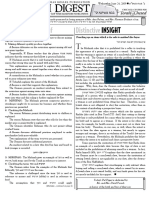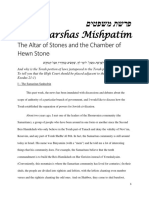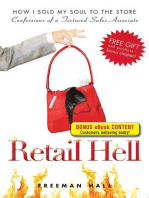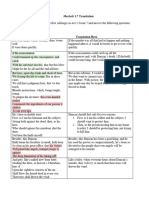L & L - Acharei Mos-Kedoshim - Beer After Pesach Debate
L & L - Acharei Mos-Kedoshim - Beer After Pesach Debate
Uploaded by
Beni KrohnCopyright:
Available Formats
L & L - Acharei Mos-Kedoshim - Beer After Pesach Debate
L & L - Acharei Mos-Kedoshim - Beer After Pesach Debate
Uploaded by
Beni KrohnOriginal Title
Copyright
Available Formats
Share this document
Did you find this document useful?
Is this content inappropriate?
Copyright:
Available Formats
L & L - Acharei Mos-Kedoshim - Beer After Pesach Debate
L & L - Acharei Mos-Kedoshim - Beer After Pesach Debate
Uploaded by
Beni KrohnCopyright:
Available Formats
1
בס"ד
The Great Beer After Pesach 5778 Debate
A case study in the issue of chametz after Pesach
1. http://www.crainsnewyork.com/article/20160214/SMALLBIZ/302149997/new-yorks-beer-
king-simon-bergson-surveys-his-empire-built-on-coors-light-corona-and-other-brands
February 14, 2016 12:01 a.m. Updated 02/17/2016
A hyperactive Coney Island kid figured out how to beat Budweiser
Simon Bergson's Manhattan Beer Distributors is the largest beer wholesaler in New
York City
By Rosa Goldensohn
….Bergson, who was born in a displaced-persons camp in Austria in 1948 and is in the habit of
holstering a .380 semiautomatic pistol under his cardigan, commands the dogs in Yiddish. “To lie
down is platz,” he said. Still, the canine training is the closest thing Bergson, 67, has to a hobby….
Milton Bergson, born Mordechai, worked for five years as a slave laborer in the Nazi concentration
camps of Sachsenhausen, Mauthausen and Auschwitz. In New York, he learned the garment
business, and built up a factory of 30 tailors making suits for dead Appalachian miners to wear in
their coffins. “The workmanship wasn’t so terrific,” Simon Bergson said. But as his father would say,
“The customer never complained.”
“I was enjoying Tucson; it was mellow, it was nice, it was lovely,” Bergson remembered. “My father
desperately wanted me back in New York.”
Simon Bergson’s parents both came from the Polish town of Ciechanów, though they did not know
each other there. “My mother [Nadzia] came from a fairly well-off background,” Bergson said. “She
had maids in the house cleaning up, she studied violin, she used to go ice skating in the wintertime.
She went to the public high school, which was very unusual for a Jewish girl pre-war because
usually they went to the Jewish schools, because I guess my grandfather was some form of nobility
because he owned the general store in town.”
In Auschwitz, Milton was able to get to the women’s camp on Sundays. Looking for “the girls from
Ciechanów” at Birkenau, he found Nadzia, nine years his junior. After the war, they returned to their
town to look for relatives. All of hers were dead; three of his seven siblings survived. Then began a
four-year journey to America and an eventual landing in Brooklyn.
שו"ת אגרות משה אורח חיים חלק א סימן קמט .2
מע"כ ידידי הרה"ג מהר"ר נחמן.בחנונים חשודים לאיסור חמץ שמכרו חמצם לנכרי ע"י הרב כנהוג ה' אייר תשי"ז
.יוסף גאלדשטיין שליט"א
2
בדבר החנונים שמוכרים חמצם ע"י הרב כנהוג והוא חשוד לעבור לסחור בחמץ בפסח ונוטל כל מה שצריך למכור
פשוט שאין זה בטול על המכירה כי מצד תנאי המכירה להעכו"ם נכתב בשטר,בפסח מאלו החמץ שמכר ע"י הרב
המכירה שמה שיטול יהיה כקונה אז מהעכו"ם ויצטרך לנכות מהסך שחייב לו העכו"ם וממילא אין כאן שום בטול על
.המכירה ומה שלא לקח הוא של העכו"ם
שהוא ודאי עבר,ובלא זה אין שייך לבטל קנין שכבר נעשה ואינו שוב בעלים על זה אלא הוא או כקונה מחדש או כגוזל
.על בל יראה כיון שקנה בין למקח בין לגזל אבל רק על מה שלקח בידו וקנה ולא על מה שנשאר
דמה"ת נימא כן דאף שחשוד לעבור להנאתו כשאינו,ואין לומר שאיגלאי מילתא שלא מכר בלב שלם אלא שהערים
הוא,' ואף אם נימא שבזה"ז במדינה זו ליכא חזקה זו דבחולין דף ד.יכול בהיתר לא יעבור על מה שיכול לעשות בהיתר
, ודאי לא נימא שבלבו לא רצה בההיתר,רק שלא יחליף שהוא לבקש תחבולות להיתר אבל על מה שעשה בהיתר ממש
. משה פיינשטיין, ידידו.ולכן ברור ופשוט שהמכירה קיימת וטוב עשה כתר"ה שהשתדל שימכרו חמצם
מפניני הרב עמ' פד .3
4. https://oukosher.org/faqs/why-is-mechirat-chametz-for-a-supermarket-that-
continues-to-sell-chametz-during-pesach-a-valid-sale/
Why is mechirat chametz for a supermarket that continues to sell chametz during Pesach a valid
sale?
Good question. Many posekim fundamentally oppose the sale of Jewish-owned businesses that
sell chametz on Pesach. In stark contrast to the mechirat chametz of a halachically observant
Jew, the sale of a supermarket that is fully open for business on Pesach lacks the aura of
respectability. The seller is clearly not sincere about the sale. For this reason, Rabbi Joseph B.
Soloveitchik (1903-1993) and others considered sales involving supermarkets that sell chametz
to customers on Pesach to have no validity. Nonetheless, Rav Moshe (Iggerot Moshe, OC 1:149,
2:91 and 4:95) was the champion of this transaction. He put forward various arguments of
justification, one of which is that halachah does not take into consideration private thoughts
(devarim shebelev) that are not verifiable. Furthermore, it is conceivable that the storeowner
prefers to transfer ownership of his chametz to a non-Jew so his religious customers can shop
freely in his establishment after Pesach, even though he intends to continue selling chametz
merchandise during Pesach. The OU follows the more stringent position of Rabbi Soloveitchik.
You might also like
- The Acts of The Second Council of Nicaea (787) (Richard Price) (Z-Library)Document762 pagesThe Acts of The Second Council of Nicaea (787) (Richard Price) (Z-Library)David Abraham100% (1)
- Responsa From The HolocaustDocument4 pagesResponsa From The HolocauststraibermanNo ratings yet
- The Church in Iraq - Fernando FiloniDocument185 pagesThe Church in Iraq - Fernando Filonijmmg2005No ratings yet
- Munkatch Ami Mag Sukkos 5776Document12 pagesMunkatch Ami Mag Sukkos 5776Hirshel Tzig100% (2)
- Forty Five Years On The BlockDocument180 pagesForty Five Years On The BlockZvi Peretz CohenNo ratings yet
- Chassidut VishnitzDocument17 pagesChassidut VishnitzCarina GhitaNo ratings yet
- Bava Metzia 060 PDFDocument2 pagesBava Metzia 060 PDFmasmidNo ratings yet
- The World Is Built With Kindness: 15 Chassidic Tales for ShavuosFrom EverandThe World Is Built With Kindness: 15 Chassidic Tales for ShavuosNo ratings yet
- Bob Chester's GritDocument150 pagesBob Chester's GritRajib DasNo ratings yet
- Talmud QuotesDocument22 pagesTalmud QuotesRobin TobarNo ratings yet
- The Inn on Jericho Road: A retelling of the Good Samaritan storyFrom EverandThe Inn on Jericho Road: A retelling of the Good Samaritan storyNo ratings yet
- Parshas Mishpatim: The Altar of Stones and The Chamber of Hewn StoneDocument8 pagesParshas Mishpatim: The Altar of Stones and The Chamber of Hewn StoneEdson Alves dos Santos JuniorNo ratings yet
- L'Iluy Nishmas Imi Morosi Chavoh Bas Zvi Nif'T'Roh 6 Ador 5723 TNTZB"H Sedrah Selections Parshas T'Tza'Veh 5772 BS"DDocument4 pagesL'Iluy Nishmas Imi Morosi Chavoh Bas Zvi Nif'T'Roh 6 Ador 5723 TNTZB"H Sedrah Selections Parshas T'Tza'Veh 5772 BS"Dshlomo01No ratings yet
- Bava Metzia 043 PDFDocument2 pagesBava Metzia 043 PDFmasmidNo ratings yet
- UntitledDocument6 pagesUntitledoutdash2No ratings yet
- Inyan ArticleDocument7 pagesInyan ArticleAryeh SchechterNo ratings yet
- Israel AdvocateDocument66 pagesIsrael AdvocatesergioealexiaNo ratings yet
- Shabbos Stories For Parshas Metzora 5784Document15 pagesShabbos Stories For Parshas Metzora 5784mendi raijerNo ratings yet
- Week3 Sheck95 ThiefDocument306 pagesWeek3 Sheck95 ThiefAbhijeet GhorpadeNo ratings yet
- Daf Ditty Pesachim 63: Beit Pagi/Walls of JerusalemDocument34 pagesDaf Ditty Pesachim 63: Beit Pagi/Walls of JerusalemJulian Ungar-SargonNo ratings yet
- Shabbos Stories For Parshas Nasso 5781Document16 pagesShabbos Stories For Parshas Nasso 5781ákos kuruczNo ratings yet
- FL 4ef4491370f55Document2 pagesFL 4ef4491370f55shlomo01No ratings yet
- Complete Download Chartography The Weird and Wonderful World of Infographics Stephen Wildish PDF All ChaptersDocument55 pagesComplete Download Chartography The Weird and Wonderful World of Infographics Stephen Wildish PDF All Chapterschavagerraxe100% (2)
- The Story Behind The Laws: 29 Shevat, 5777/february 25, 2017 Parshat Mishpatim/Shekalim Vol. 8 Num. 25Document4 pagesThe Story Behind The Laws: 29 Shevat, 5777/february 25, 2017 Parshat Mishpatim/Shekalim Vol. 8 Num. 25outdash2No ratings yet
- Disagreements and CountryDocument5 pagesDisagreements and CountrySteven MoskowitzNo ratings yet
- Siman 55 Seif 10-13Document1 pageSiman 55 Seif 10-13Василий ТкачевNo ratings yet
- Noahide NewsDocument103 pagesNoahide NewsLawrence Jones67% (3)
- The Making of Bobby Burnit: Being a Record of the Adventures of a Live American Young ManFrom EverandThe Making of Bobby Burnit: Being a Record of the Adventures of a Live American Young ManNo ratings yet
- Siman 19 Seif 1 - Siman 20 Seif 2Document1 pageSiman 19 Seif 1 - Siman 20 Seif 2Василий ТкачевNo ratings yet
- The Memoirs of Constantine Dix: 'I am also, as you may have conjectured, a thief''From EverandThe Memoirs of Constantine Dix: 'I am also, as you may have conjectured, a thief''No ratings yet
- 05-79hal Hisotry-Eli Cohen-Final - 0Document6 pages05-79hal Hisotry-Eli Cohen-Final - 0Fidel MorenoNo ratings yet
- The Struggles of Brown, Jones, and Robinson: By One of the FirmFrom EverandThe Struggles of Brown, Jones, and Robinson: By One of the FirmNo ratings yet
- To A Place of Destruction - Advetures in Practical Halacha No. 4Document12 pagesTo A Place of Destruction - Advetures in Practical Halacha No. 4MordechaNo ratings yet
- The Seeds of Love and War: Still Shaggin' for a Shillin'From EverandThe Seeds of Love and War: Still Shaggin' for a Shillin'No ratings yet
- 154aea4717aa27259f67f1a2ff3481e1Document14 pages154aea4717aa27259f67f1a2ff3481e1javier romero gonzalezNo ratings yet
- A Little Known History of Brisbane VillageDocument18 pagesA Little Known History of Brisbane VillageAlbert PetersenNo ratings yet
- Retail Hell: How I Sold My Soul to the StoreFrom EverandRetail Hell: How I Sold My Soul to the StoreRating: 4.5 out of 5 stars4.5/5 (4)
- Featured Articles Weekly Columns: Spreading The Rebbe'S Light and Joy From The Halls of MontezumaDocument40 pagesFeatured Articles Weekly Columns: Spreading The Rebbe'S Light and Joy From The Halls of MontezumaB. MerkurNo ratings yet
- Thirty Years a Slave: From Bondage to Freedom: The Institution of Slavery as Seen on the Plantation and in the Home of the Planter: Autobiography of Louis HughesFrom EverandThirty Years a Slave: From Bondage to Freedom: The Institution of Slavery as Seen on the Plantation and in the Home of the Planter: Autobiography of Louis HughesNo ratings yet
- The Kabbalah of Life: A much deeper look into our surroundingsFrom EverandThe Kabbalah of Life: A much deeper look into our surroundingsNo ratings yet
- Esther Chapter 3: 1 After These Things Did KingDocument3 pagesEsther Chapter 3: 1 After These Things Did Kingvendredi67No ratings yet
- Unit 10Document14 pagesUnit 10palriya30No ratings yet
- The Healing Ministry of Jesus and Its ReDocument23 pagesThe Healing Ministry of Jesus and Its ReJeevaraj AnthonyNo ratings yet
- Bhramayagnam, MahasankalpamDocument2 pagesBhramayagnam, Mahasankalpamjayavenky_608089473100% (1)
- ArticleDocument7 pagesArticleSabyasachi SarangiNo ratings yet
- Format of ExcelDocument3 pagesFormat of Excelkritikatusid17No ratings yet
- Solution Manual Financial Accounting 1 Valix 2018 All New PDF Printable 2019Document19 pagesSolution Manual Financial Accounting 1 Valix 2018 All New PDF Printable 2019Bjay AledonNo ratings yet
- 7 Sorrows Rosary PrayerDocument4 pages7 Sorrows Rosary PrayerClark Lopez de LoyolaNo ratings yet
- Macbeth Act 1.7 TranslationDocument2 pagesMacbeth Act 1.7 Translationcolorsofpassion.sunshineNo ratings yet
- 123literature Under Spanish Colonialism (1565-1897) 1-111Document59 pages123literature Under Spanish Colonialism (1565-1897) 1-111Erikson SantiagoNo ratings yet
- QuotesDocument10 pagesQuotesVinayNo ratings yet
- Christ's - Disciples - Making - Disciples With Solfa NotationDocument2 pagesChrist's - Disciples - Making - Disciples With Solfa NotationodunayoolaniyiNo ratings yet
- Lesson 5 Noah Obey God Feb. 7 2021Document4 pagesLesson 5 Noah Obey God Feb. 7 2021Mikaela EusebioNo ratings yet
- Focussed I AM MeditationDocument35 pagesFocussed I AM MeditationPradeep Apte100% (11)
- Healing of NaamanDocument50 pagesHealing of NaamanhabatmuNo ratings yet
- O Istorie A Bisericii CatoliceDocument367 pagesO Istorie A Bisericii Catolicemihaimm03mNo ratings yet
- Forgiveness Teaching NotesDocument2 pagesForgiveness Teaching NotesMildred AkorfaNo ratings yet
- June 9 Lit 2Document2 pagesJune 9 Lit 2JoyceTamondongNo ratings yet
- Hazrat Nasiruddin Mahmood Chiragh DehlaviDocument12 pagesHazrat Nasiruddin Mahmood Chiragh DehlaviMohammed Abdul Hafeez, B.Com., Hyderabad, IndiaNo ratings yet
- APUSH Chapter 11 OutlinesDocument6 pagesAPUSH Chapter 11 OutlinesClaudia HuoNo ratings yet
- CHAPTER Tugas BingDocument2 pagesCHAPTER Tugas BingIntan NuriaNo ratings yet
- First Philosophy and The First DistinctiDocument23 pagesFirst Philosophy and The First DistinctiKarl PopperNo ratings yet
- Data Peserta BPJS TK Dan BPJS KES 30 Nopember 18 - Buruh PabrikDocument20 pagesData Peserta BPJS TK Dan BPJS KES 30 Nopember 18 - Buruh PabrikMerin Zuldani AlamNo ratings yet
- Tapak Markah Tahap 2 - PSS 4abDocument49 pagesTapak Markah Tahap 2 - PSS 4abzamri82No ratings yet
- Do It Heartily SermonDocument2 pagesDo It Heartily SermonGeths MahinayNo ratings yet
- 2nded SnapshotsOfAncientHistory PDFDocument178 pages2nded SnapshotsOfAncientHistory PDFrhoffmaniiiNo ratings yet
- Intellectual History of UkraineDocument432 pagesIntellectual History of UkraineRochefouNo ratings yet
- LasombraDocument3 pagesLasombraTiberio RumaNo ratings yet

























































































